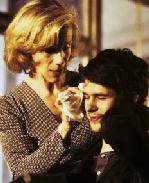SITE GUIDE
SEARCH
REVIEWS
FEATURES
NEWS
Etcetera and
Short Term Listings
LISTINGS
Broadway
Off-Broadway
NYC Restaurants
BOOKS and CDs
OTHER PLACES
Berkshires
London
California
DC
Philadelphia
Elsewhere
QUOTES
On TKTS
PLAYWRIGHTS' ALBUMS
LETTERS TO EDITOR
FILM
LINKS
MISCELLANEOUS
Free Updates
Masthead
Writing for Us
A CurtainUp  London Review
London Review
 London Review
London ReviewThe Seagull
by Neil Dowden
|
I'm in mourning for my life.
---- Masha |

Juliet Stevenson as Mme Arkadina, Ben Whishaw as Konstantin
(Photo: Stephen Cummiskey) |
By taking The Seagull out of its pre-Revolutionary Russia social context and staging it in a non-specific setting, Crimp and Mitchell leave the play in a nebulous no man's land. True, Vicki Mortimer's design of a large dilapidated house with cracks in its plaster (and where the ceiling almost collapses at one point) does evoke the decline of a doomed class, while Chris Davey's ghostly lighting suggests that its inhabitants are already fading away. But the anachronistic mix of a phonograph playing Don Giovanni, several episodes of tango dancing and a bizarre concoction of costumes makes the story unrooted and disorientating.
At the heart of the drama, young wannabe actress Nina (Hattie Morahan) - the ill-fated 'seagull' of the title - is loved by the suicidal novice playwright Konstantin (Ben Whishaw), but is seduced away by the successful if mediocre novelist Trigorin (Mark Bazeley), who is partner to Konstantin's mother Arkadina (Juliet Stevenson), a grand dame of the theatre.
The pattern of one person loving someone who loves someone else is repeated amongst the minor characters too as Masha (Sandy McDade) gives up her unrequited passion for Konstantin to marry the ineffectual schoolteacher Medvedienko (Justin Salinger), while Polina (Liz Kettle) is trapped in her marriage to boring estate manager Shamraev (Michael Gould) but pines after disillusioned doctor Dorn (Angus Wright).
Of course, Chekhov's characters tend to be self-centred and self-pitying, feeling that they are wasting their lives and not fulfilling their potential, but here it's difficult to sympathize with them at all as they are all portrayed as neurotics. The production's febrile atmosphere is accentuated by the increasingly irritating ploy of having servants continually criss-crossing the stage as they go about their daily work -- presumably emphasizing the class distinction -- so that intimate conversations are repeatedly interrupted. Apart from the distraction, audibility suffers too.
The opening act in which the attractive but untalented Nina performs Konstantin's pretentious symbolist monologue reveals the best and worst of this production. The idea of inverting the action so that we see the uneasy audience of Arkadina, Trigorin et al. from the backstage point of view is brilliant, so that for us they become the spectacle, but it is undermined by the fact that it is virtually impossible to hear Nina's whispered words, so that Chekhov's spiritual versus material theme is largely lost.
The fraught mother/son relationship between Juliet Stevenson's self-dramatizing Arkadina and Ben Whishaw's melancholy Konstantin - reminiscent of Gertrude and Hamlet's - is rather convincing, especially the tender scene where she changes the bandage for his head wound before they both revert to quarrelling. Hattie Morahan's Nina is a touching performance, but Mark Bazeley is so underpowered as Trigorin that you wonder what the women see in him. Sandy McDade makes a big impact as the bitterly funny though deeply unhappy Masha, and Angus Wright suggests hidden depths to Dorn's ennui but his shouting of the last climactic line is a misjudgement all too characteristic of the show as a whole.
|
THE SEAGULL
Written by Anton Chekhov Version by Martin Crimp Directed by Katie Mitchell Starring: Juliet Stevenson, Ben Whishaw, Hattie Morahan, Mark Bazeley With: Gawn Grainger, Michael Gould, Liz Kettle, Sandy McDade, Angus Wright, Justin Salinger, Sean Jackson, James Bolt, Beth Fitzgerald, Jonah Russell Design: Vicki Mortimer Lighting: Chris Davey Music: Simon Allen A Royal National Theatre production Running time: 2 hour 45 minutes with one interval Box Office: 020 7452 3000 Booking to 23rd September 2006 Reviewed by Neil Dowden based on 27th June 2006 performance at the Lyttelton, National Theatre, South Bank, London SE1(Underground/Rail: Waterloo) |
|
London Theatre Tickets Lion King Tickets Billy Elliot Tickets Mary Poppins Tickets Mamma Mia Tickets We Will Rock You Tickets Theatre Tickets |




